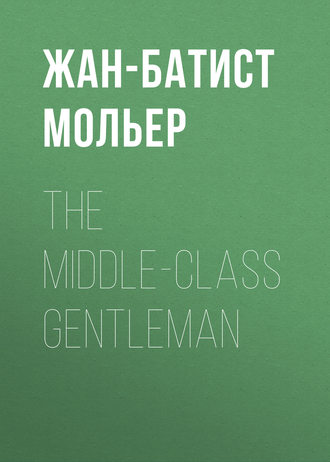
Мольер (Жан-Батист Поклен)
The Middle-Class Gentleman
ACT ONE
SCENE I (Music Master, Dancing Master, Musicians, and Dancers)
(The play opens with a great assembly of instruments, and in the middle of the stage is a pupil of the Music Master seated at a table composing a melody which Monsieur Jourdain has ordered for a serenade.)
MUSIC MASTER: (To Musicians) Come, come into this room, sit there and wait until he comes.
DANCING MASTER: (To dancers) And you too, on this side.
MUSIC MASTER: (To Pupil) Is it done?
PUPIL: Yes.
MUSIC MASTER: Let's see.. This is good.
DANCING MASTER: Is it something new?
MUSIC MASTER: Yes, it's a melody for a serenade that I set him to composing here, while waiting for our man to awake.
DANCING MASTER: May I see it?
MUSIC MASTER: You'll hear it, with the dialogue, when he comes. He won't be long.
DANCING MASTER: Our work, yours and mine, is not trivial at present.
MUSIC MASTER: This is true. We've found here such a man as we both need. This is a nice source of income for us – this Monsieur Jourdain, with the visions of nobility and gallantry that he has gotten into his head. You and I should hope that everyone resembled him.
DANCING MASTER: Not entirely; I could wish that he understood better the things that we give him.
MUSIC MASTER: It's true that he understands them poorly, but he pays well, and that's what our art needs now more than anything else.
DANCING MASTER: As for me, I admit, I feed a little on glory. Applause touches me; and I hold that, in all the fine arts, it is painful to produce for dolts, to endure the barbarous opinions of a fool about my choreography. It is a pleasure, don't tell me otherwise, to work for people who can appreciate the fine points of an art, who know how to give a sweet reception to the beauties of a work and, by pleasurable approbations, gratify us for our labor. Yes, the most agreeable recompense we can receive for the things we do is to see them recognized and flattered by an applause that honors us. There is nothing, in my opinion, that pays us better for all our fatigue; and it is an exquisite delight to receive the praises of the well-informed.
MUSIC MASTER: I agree, and I enjoy them as you do. There is surely nothing more agreeable than the applause you speak of; but that incense does not provide a living. Pure praises do not provide a comfortable existence; it is necessary to add something solid, and the best way to praise is to praise with cash-in-hand. He's a man, it's true, whose insight is very slight, who talks nonsense about everything and applauds only for the wrong reasons but his money makes up for his judgments. He has discernment in his purse. His praises are in cash, and this ignorant bourgeois is worth more to us, as you see, than the educated nobleman who introduced us here.
DANCING MASTER: There is some truth in what you say; but I find that you lean a little too heavily on money; and material interest is something so base that a man of good taste should never show an attachment to it.
MUSIC MASTER: You are ready enough to receive the money our man gives you.
DANCING MASTER: Assuredly; but I don't place all my happiness in it, and I could wish that together with his fortune he had some good taste in things.
MUSIC MASTER: I could wish it too, that's what both of us are working for as much as we can. But, in any case, he gives us the means to make ourselves known in the world; and he will pay others if they will praise him.
DANCING MASTER: Here he comes.
SCENE II (Monsieur Jourdain, Two Lackeys, Music Master, Dancing Master, Pupil, Musicians, and Dancers)
MONSIEUR JOURDAIN: Well gentlemen? What's this? Are you going to show me your little skit?
DANCING MASTER: How? What little skit?
MONSIEUR JOURDAIN: Well, the.. What-do-you-call it? Your prologue or dialogue of songs and dances.
DANCING MASTER: Ha, ha!
MUSIC MASTER: You find us ready for you.
MONSIEUR JOURDAIN: I kept you waiting a little, but it's because I'm having myself dressed today like the people of quality, and my tailor sent me some silk stockings that I thought I would never get on.
MUSIC MASTER: We are here only to wait upon your leisure.
MONSIEUR JOURDAIN: I want you both to stay until they have brought me my suit, so that you may see me.
DANCING MASTER: Whatever you would like.
MONSIEUR JOURDAIN: You will see me fitted out properly, from head to foot.
MUSIC MASTER: We have no doubt of it.
MONSIEUR JOURDAIN: I had this robe made for me.
DANCING MASTER: It's very attractive.
MONSIEUR JOURDAIN: My tailor told me the people of quality dress like this in the mornings.
MUSIC MASTER: It's marvelously becoming.
MONSIEUR JOURDAIN: Hey lackeys! My two lackeys!
FIRST LACKEY; What do you wish, Sir?
MONSIEUR JOURDAIN: Nothing. I just wanted to see if you were paying attention. (To the two masters) What say you of my liveries?
DANCING MASTER: They're magnificent.
MONSIEUR JOURDAIN: (Half opening his gown, showing a pair of tight red velvet breeches, and a green velvet vest, that he is wearing) Here again is a sort of lounging dress to perform my morning exercises in.
MUSIC MASTER: It is elegant.
MONSIEUR JOURDAIN: Lackey!
FIRST LACKEY: Sir?
MONSIEUR JOURDAIN: The other lackey!
SECOND LACKEY: Sir?
MONSIEUR JOURDAIN: Hold my robe.
(To the Masters) Do you think I look good?
DANCING MASTER: Very well. No one could look better.
MONSIEUR JOURDAIN: Now let's have a look at your little show.
MUSIC MASTER: I would like very much for you to listen to a melody he (indicating his student) has just composed for the serenade that you ordered from me. He's one of my pupils who has an admirable talent for these kinds of things.
MONSIEUR JOURDAIN: Yes, but you should not have had that done by a pupil; you yourself were none too good for that piece of work.
MUSIC MASTER: You must not let the name of pupil fool you, sir. Pupils of this sort know as much as the greatest masters, and the melody is as fine as could be made. Just listen.
MONSIEUR JOURDAIN: (To Lackeys) Give me my robe so I can listen better.. Wait, I believe I would be better without a robe.. No, give it back, that will be better.
MUSICIAN: (Singing) I languish night and day, my suffering is extreme Since to your control your lovely eyes subjected me; If you thus treat, fair Iris, those you love, Alas, how would you treat an enemy?
MONSIEUR JOURDAIN: This song seems to me a little mournful, it lulls to sleep, and I would like it if you could liven it up a little, here and there.
MUSIC MASTER: It is necessary, Sir, that the tune be suited to the words.
MONSIEUR JOURDAIN: Someone taught me a perfectly pretty one some time ago. Listen.. Now.. how does it go?
DANCING MASTER: By my faith, I don't know.
MONSIEUR JOURDAIN: There are sheep in it.
DANCING MASTER: Sheep?
MONSIEUR JOURDAIN: Yes. Ah! (He sings)
I thought my Jeanneton As beautiful as sweet; I thought my Janneton Far sweeter than a sheep. Alas! Alas! She is a hundred times, A thousand times, more cruel Than tigers in the woods!
Isn't it pretty?
MUSIC MASTER: The prettiest in the world.
DANCING MASTER: And you sing it well.
MONSIEUR JOURDAIN: It's without having learned music.
MUSIC MASTER: You ought to learn it, Sir, as you are learning dancing. They are two arts which have a close connection.
DANCING MASTER: And which open the mind of a man to fine things.
MONSIEUR JOURDAIN: And do people of quality learn music, too?
MUSIC MASTER: Yes sir.
MONSIEUR JOURDAIN: I'll learn it then. But I don't know when I can find time; for besides the Fencing Master who's teaching me, I have also engaged a master of philosophy who is to begin this morning.
MUSIC MASTER: Philosophy is something; but music, sir, music..
DANCING MASTER: Music and dancing, music and dancing, that's all that's necessary.
MUSIC MASTER: There's nothing so useful in a State as music.
DANCING MASTER: There's nothing so necessary to men as dancing.
MUSIC MASTER: Without music, a State cannot subsist.
DANCING MASTER: Without the dance, a man can do nothing.
MUSIC MASTER: All the disorders, all the wars one sees in the world happen only from not learning music.
DANCING MASTER: All the misfortunes of mankind, all the dreadful disasters that fill the history books, the blunders of politicians and the faults of omission of great commanders, all this comes from not knowing how to dance.
MONSIEUR JOURDAIN: How is that?
MUSIC MASTER: Does not war result from a lack of agreement between men?
MONSIEUR JOURDAIN: That is true.
MUSIC MASTER: And if all men learned music, wouldn't that be a means of bringing about harmony and of seeing universal peace in the world?
MONSIEUR JOURDAIN: You are right.
DANCING MASTER: When a man has committed a mistake in his conduct, in family affairs, or in affairs of government of a state, or in the command of an army, do we not always say, "He took a bad step in such and such an affair?"
MONSIEUR JOURDAIN: Yes, that's said.
DANCING MASTER: And can taking a bad step result from anything but not knowing how to dance?
MONSIEUR JOURDAIN: It's true, you are both right.
DANCING MASTER: It makes you see the excellence and usefulness of music and the dance.
MONSIEUR JOURDAIN: I understand that, now.
MUSIC MASTER: Do you wish to see our pieces?
MONSIEUR JOURDAIN: Yes.
MUSIC MASTER: I have already told you that this is a little attempt I have made to show the different passions that music can express.
MONSIEUR JOURDAIN: Very good.
MUSIC MASTER (To musicians) Here, come forward. (To Monsieur Jourdain) You must imagine that they are dressed as shepherds.
MONSIEUR JOURDAIN: Why always as shepherds? You see nothing but that everywhere.
MUSIC MASTER: When we have characters that are to speak in music, it's necessary, for believability, to make them pastoral. Singing has always been assigned to shepherds; and it is scarcely natural dialogue for princes or merchants to sing their passions.
MONSIEUR JOURDAIN: Alright, alright. Let's see.
DIALOGUE IN MUSIC: (A Woman and Two Men)
ALL THREE: A heart, under the domination of love, Is always with a thousand cares oppressed. It is said that we gladly languish, gladly sigh; But, despite what can be said, There is nothing so sweet as our liberty!
FIRST MAN: There is nothing so sweet as the loving fires That make two hearts beat as one. One cannot live without amorous desires; Take love from life, you take away the pleasures.
SECOND MAN: It would be sweet to submit to love's rule, If one could find faithful love, But, alas! oh cruel rule! No faithful shepherdess is to be seen, And that inconstant sex, much too unworthy, Must renounce love eternally.
FIRST MAN: Pleasing ardor!
WOMAN: Happy liberty!
SECOND MAN: Deceitful woman!
FIRST MAN: How precious you are to me!
WOMAN: How you please my heart!
SECOND MAN: How horrible you are to me!
FIRST MAN: Ah, leave, for love, that mortal hate!
WOMAN: We can, we can show you a faithful shepherdess!
SECOND MAN: Alas! Where to find her?
WOMAN: In order to defend our reputation, I want to offer you my heart!
FIRST MAN: But, shepherdess, can I believe That it will not be deceitful?
WOMAN: We'll see through experience, Who of the two loves best.
SECOND MAN: Who lacks constancy, May the gods destroy!
ALL THREE: With ardors so beautiful Let us be inflamed! Ah, how sweet it is to love, When two hearts are faithful!
MONSIEUR JOURDAIN: Is that all?
MUSIC MASTER: Yes.
MONSIEUR JOURDAIN: I find it well-done, and there are some pretty enough sayings in it.
DANCING MASTER: Here, for my presentation, is a little display of the loveliest movements and the most beautiful attitudes with which a dance can possibly be varied.
MONSIEUR JOURDAIN: Are these shepherds too?
DANCING MASTER: They're whatever you please. Let's go!
(Four dancers execute all the different movements and all the kinds of steps that the Dancing Master commands; and this dance makes the First Interlude.)
ACT TWO
SCENE I (Monsieur Jourdain, Music Master, Dancing Master, Lackeys)
MONSIEUR JOURDAIN: That's not all that bad, and those people there hop around well.
MUSIC MASTER: When the dance is combined with the music, it will have even better effect, and you will see something quite good in the little ballet we have prepared for you.
MONSIEUR JOURDAIN: That's for later, when the person I ordered all this for is to do me the honor of coming here to dine.
DANCING MASTER: Everything is ready.
MUSIC MASTER: However, sir, this is not enough. A person like you, who lives magnificently, and who are inclined towards fine things, should have a concert of music here every Wednesday or every Thursday.
MONSIEUR JOURDAIN: Is that what people of quality do?
MUSIC MASTER: Yes, Sir.
MONSIEUR JOURDAIN: Then I'll have them. Will it be fine?
MUSIC MASTER: Without doubt. You must have three voices- a tenor, a soprano, and a bass, who will be accompanied by a bass-viol, a theorbo, and a clavecin for the chords, with two violins to play the ritournelles.
MONSIEUR JOURDAIN: You must also add a trumpet marine. The trumpet marine is an instrument that pleases me and it's harmonious.
MUSIC MASTER: Leave it to us to manage things.
MONSIEUR JOURDAIN: At least, don't forget to send the musicians to sing at table.
MUSIC MASTER: You will have everything you should have.
MONSIEUR JOURDAIN: But above all, let the ballet be fine.
MUSIC MASTER: You will be pleased with it, and, among other things, with certain minuets you will find in it.
MONSIEUR JOURDAIN: Ah! Minuets are my dance, and I would like you to see me dance them. Come, my Dancing Master.
DANCING MASTER: A hat, sir, if you please. La, la, la, la. La, la, la, la. In cadence please. La, la, la, la. Your right leg. La, la, la, la. Don't move your shoulders so. La, la, la, la. Your arms are wrong. La, la, la, la. Raise your head. Turn the toe out. La, la, la, la. Straighten your body up.
MONSIEUR JOURDAIN: How was that? (Breathlessly)
MUSIC MASTER: The best.
MONSIEUR JOURDAIN: By the way, teach me how to bow to salute a marchioness; I shall need to know soon.
DANCING MASTER: How you must bow to salute a marchioness?
MONSIEUR JOURDAIN: Yes, a marchioness named Dorimène.
DANCING MASTER: Give me your hand.
MONSIEUR JOURDAIN: No. You only have to do it, I'll remember it well.
DANCING MASTER: If you want to salute her with a great deal of respect, you must first bow and step back, then bow three times as you walk towards her, and at the last one bow down to her knees.
MONSIEUR JOURDAIN: (After the Dancing Master has illustrated) Do it some. Good!
LACKEY: Sir, your Fencing Master is here.
MONSIEUR JOURDAIN: Tell him to come in here for my lesson. I want you to see me perform.
SCENE II (Fencing Master, Music Master, Dancing Master, Monsier Jourdain, a Lackey)
FENCING MASTER: (After giving a foil to Monsieur Jourdain) Come, sir, the salute. Your body straight. A little inclined upon the left thigh. Your legs not so wide apart. Your feet both in a line. Your wrist opposite your hip. The point of your sword even with your shoulder. The arm not so much extended. The left hand at the level of the eye. The left shoulder more squared. The head up. The expression bold. Advance. The body steady. Beat carte, and thrust. One, two. Recover. Again, with the foot firm. Leap back. When you make a pass, Sir, you must first disengage, and your body must be well turned. One, two. Come, beat tierce and thrust. Advance. Stop there. One, two. Recover. Repeat. Leap back. On guard, Sir, on guard. (The fencing master touches him two or three times with the foil while saying, "On guard." )
MONSIEUR JOURDAIN: How was that? (Breathlessly)
MUSIC MASTER: You did marvelously!
FENCING MASTER: As I have told you, the entire secret of fencing lies in two things: to give and not to receive; and as I demonstrated to you the other day, it is impossible for you to receive, if you know how to turn your opponent's sword from the line of your body. This depends solely on a slight movement of the wrist, either inward or outward.
MONSIEUR JOURDAIN: In this way then, a man, without courage, is sure to kill his man and not be killed himself?
FENCING MASTER: Without doubt. Didn't you see the demonstration?
MONSIEUR JOURDAIN: Yes.
FENCING MASTER: And thus you have seen how men like me should be considered by the State, and how the science of fencing is more important than all the other useless sciences, such as dancing, music, …
DANCING MASTER: Careful there, Monsieur swordsman! Speak of the dance only with respect.
MUSIC MASTER: I beg you to speak better of the excellence of music.
FENCING MASTER: You are amusing fellows, to want to compare your sciences with mine!
MUSIC MASTER: See the self-importance of the man!
FENCING MASTER: My little Dancing Master, I'll make you dance as you ought. And you, my little musician, I'll make you sing in a pretty way.
DANCING MASTER: Monsieur Clanger-of-iron, I'll teach you your trade.
MONSIEUR JOURDAIN: (To the Dancing Master) Are you crazy to quarrel with him, who knows tierce and quarte, and who can kill a man by demonstration?
DANCING MASTER: I disdain his demonstrations, and his tierce, and his quarte.
MONSIEUR JOURDAIN: Careful, I tell you.
FENCING MASTER: What? You little impertinent!
MONSIEUR JOURDAIN: Oh! My Fencing Master.
DANCING MASTER: What? You big workhorse!
MONSIEUR JOURDAIN: Oh! My Dancing Master.
FENCING MASTER: If I throw myself on you …
MONSIEUR JOURDAIN: Careful.
DANCING MASTER: If I get my hands on you …
MONSIEUR JOURDAIN: Be nice!
FENCING MASTER: I'll go over you with a curry-comb, in such a way…
MONSIEUR JOURDAIN: Mercy!
DANCING MASTER: I'll give you a beating such as …
MONSIEUR JOURDAIN: I beg of you!
MUSIC MASTER: Let us teach him a little how to talk!
MONSIEUR JOURDAIN: Oh Lord! Stop.
SCENE III (Philosophy Master, Music Master, Dancing Master, Fencing Master, Monsieur Jourdain, Lackeys)
MONSIEUR JOURDAIN: Aha! Monsieur Philosopher, you come just in time with your philosophy. Come, make a little peace among these people.
PHILOSOPHY MASTER: What's happening? What's the matter, gentlemen.
MONSIEUR JOURDAIN: They have got into a rage over the superiority of their professions to the point of injurious words and of wanting to come to blows.
PHILOSOPHY MASTER: What! Gentlemen, must you act this way? Haven't you read the learned treatise that Seneca composed on anger? Is there anything more base and more shameful than this passion, which turns a man into a savage beast? And shouldn't reason be the mistress of all our activities?
DANCING MASTER: Well! Sir, he has just abused both of us by, despising the dance, which I practice, and music, which is his profession.
PHILOSOPHY MASTER: A wise man is above all the insults that can be spoken to him; and the grand reply one should make to such outrages is moderation and patience.







